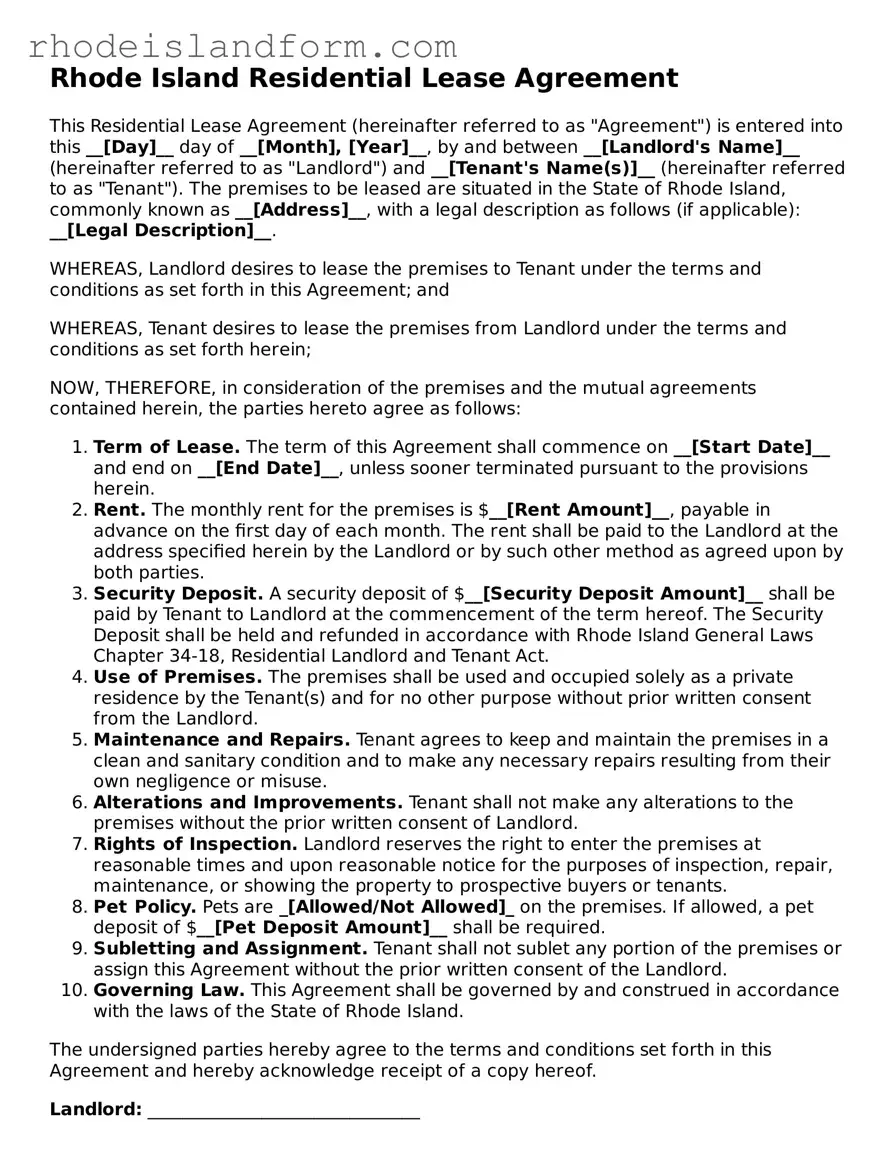Rhode Island Residential Lease Agreement
This Residential Lease Agreement (hereinafter referred to as "Agreement") is entered into this __[Day]__ day of __[Month], [Year]__, by and between __[Landlord's Name]__ (hereinafter referred to as "Landlord") and __[Tenant's Name(s)]__ (hereinafter referred to as "Tenant"). The premises to be leased are situated in the State of Rhode Island, commonly known as __[Address]__, with a legal description as follows (if applicable): __[Legal Description]__.
WHEREAS, Landlord desires to lease the premises to Tenant under the terms and conditions as set forth in this Agreement; and
WHEREAS, Tenant desires to lease the premises from Landlord under the terms and conditions as set forth herein;
NOW, THEREFORE, in consideration of the premises and the mutual agreements contained herein, the parties hereto agree as follows:
- Term of Lease. The term of this Agreement shall commence on __[Start Date]__ and end on __[End Date]__, unless sooner terminated pursuant to the provisions herein.
- Rent. The monthly rent for the premises is $__[Rent Amount]__, payable in advance on the first day of each month. The rent shall be paid to the Landlord at the address specified herein by the Landlord or by such other method as agreed upon by both parties.
- Security Deposit. A security deposit of $__[Security Deposit Amount]__ shall be paid by Tenant to Landlord at the commencement of the term hereof. The Security Deposit shall be held and refunded in accordance with Rhode Island General Laws Chapter 34-18, Residential Landlord and Tenant Act.
- Use of Premises. The premises shall be used and occupied solely as a private residence by the Tenant(s) and for no other purpose without prior written consent from the Landlord.
- Maintenance and Repairs. Tenant agrees to keep and maintain the premises in a clean and sanitary condition and to make any necessary repairs resulting from their own negligence or misuse.
- Alterations and Improvements. Tenant shall not make any alterations to the premises without the prior written consent of Landlord.
- Rights of Inspection. Landlord reserves the right to enter the premises at reasonable times and upon reasonable notice for the purposes of inspection, repair, maintenance, or showing the property to prospective buyers or tenants.
- Pet Policy. Pets are _[Allowed/Not Allowed]_ on the premises. If allowed, a pet deposit of $__[Pet Deposit Amount]__ shall be required.
- Subletting and Assignment. Tenant shall not sublet any portion of the premises or assign this Agreement without the prior written consent of the Landlord.
- Governing Law. This Agreement shall be governed by and construed in accordance with the laws of the State of Rhode Island.
The undersigned parties hereby agree to the terms and conditions set forth in this Agreement and hereby acknowledge receipt of a copy hereof.
Landlord: _______________________________
Date: ___________________
Tenant: _______________________________
Date: ___________________
If there are multiple tenants, each tenant must sign and date the Agreement.
